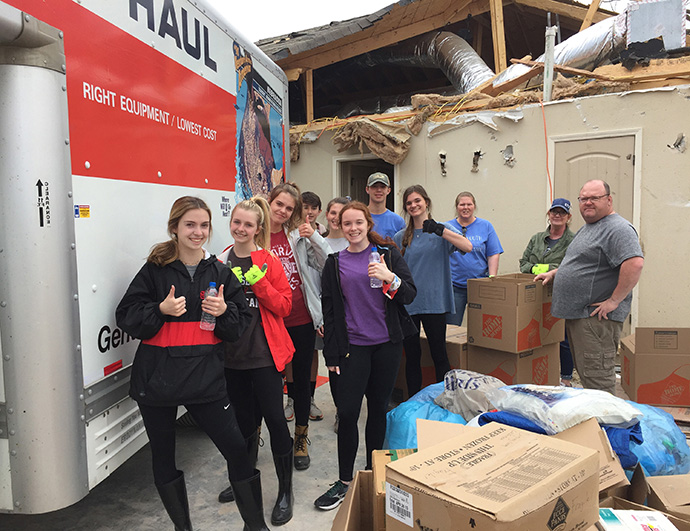When spring storms and COVID-19 collided, a gulf opened between eager volunteers and those who need them.
The Rev. Samantha Meadors, campus minister for Arkansas State University in Jonesboro, normally spends a lot of her time organizing mission trips to places cleaning up after just the kind of storm that struck Jonesboro, but she has a different message this year.
Don’t come.
“We are so grateful that we all survived this tornado with no fatalities and with relatively few injuries. Let’s continue to value lives by practicing social distancing or if possible, staying home and donating our dollars rather than our things,” she wrote to her local newspaper and posted on Facebook.
Possessions can be replaced, people cannot, she said.
“If you continue to work as a volunteer without taking proper precautions, you are valuing possessions above people,” she said.
The Rev. John Miles, pastor of First United Methodist Church in Jonesboro, said the coronavirus probably saved lives because the quarantine kept a lot of people out of the places that were heavily damaged.
“Trying to keep our volunteers safe and follow social distancing is very difficult,” he said. “I have hugged a couple of church members on instinct. I apologized profusely afterwards. This not touching thing is really hard for preachers.”
Meadors is urging donations of money and not stuff.
“Our encouragement right now is for folks to donate their money to reputable organizations like Arkansas Methodist Disaster Relief, Red Cross, United Way of Northeast Arkansas, or Salvation Army. We are also encouraging people to think long-term recovery. We know that recovery efforts don't happen in a matter of weeks, but in a matter of months or years,” Meadors said.

Youth members of First United Methodist Church Jonesboro (Ark.) and their parents work together to help move items out of a home damaged by the tornado in Jonesboro, Ark., in first days after storm. Volunteers are asked to wait until the COVID-19 threat is over. Photo courtesy of First United Methodist Church Jonesboro.
First, he learned the church had received $52,000 in earnings from a long-dormant natural gas well bequeathed to it by a church member in the 1980s. The church member had wanted her gift to go toward vehicle replacement for the church.
The next call he got was from Beth Petty, the Lebanon special school district resource director. She was calling to ask him to pray with her for a much-needed vehicle to help deliver food to schoolchildren suddenly out of school. About 50 percent of the children in the county are on the free-lunch program, Petty said.
Subscribe to our
e-newsletter
Like what you're reading and want to see more? Sign up for our free daily and weekly digests of important news and events in the life of The United Methodist Church.
Ryan told her the hair on his arm was standing up and then he told her about the first phone call.
“Within two weeks, First United Methodist Church rallied, purchased the two vehicles, added me (as a non-church member) to their auto insurance,” Petty said.
“God provided the answer before we even asked,” Bennett said.
On April 4, the cargo van delivered 30,000 pounds of food, hygiene products and cleaning supplies to a local food drive.
“We fed 350 families,” he said.
The United Methodist Committee on Relief is also encouraging volunteers not to travel. Consider making a gift online to UMCOR.
Gilbert is a news writer for United Methodist News Service, contact her at (615) 742-5470 or newsdesk@umnews.org. To read more United Methodist news, subscribe to the free Daily or Weekly Digests.
Like what you're reading? Support the ministry of UM News! Your support ensures the latest denominational news, dynamic stories and informative articles will continue to connect our global community. Make a tax-deductible donation at ResourceUMC.org/GiveUMCom.




